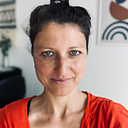The Truth About Self-Confidence and a Few Ideas to Grow It
Standing tall, relaxed, ready to playfully receive any comment, to calmly face any circumstance, to boldly create anything you desire — is this an appealing image of you? I bet the answer is yes! And if the thought that comes immediately after that is that you would love to be this person but… it is impossible because you have no self-confidence, let me tell you something: it is not a problem.
It is not a problem because self-confidence is something you can learn. And here it is - I have just told you the truth about self-confidence, straight at the beginning of the second paragraph: it is a skill and anyone can acquire it. So keep reading and learn how to grow this beautifully balanced poise.
Let’s start with a definition to ensure there is no confusion between self-confidence and self-satisfaction. The Cambridge Dictionary tells us that self-confidence is the belief that you can do things well and that other people respect you, whereas self-satisfaction is the quality of being very pleased with yourself and accepting no criticism of yourself.
Beyond the fact that self-confidence is a nice and reassuring feeling to experience, it is an attitude that connects you with others through the respect they have for you and your actions. On the contrary, self-satisfaction isolates you because it does not allow for questions. Seeking self-confidence not only increases your own well-being but also participates in creating communities based on mutual respect, so go for it!
Now moving on to the how-to question, remember that there is no such thing as “those who were born confident” and “the others”. We were all born with the same potential and the environment in which we grew up gave us more or fewer opportunities to train our ability to feel at ease in any circumstances. As children, we did not have much of a choice. Our job was to comply with whatever — good or bad — was offered us so that we could survive and reach adulthood.
For those of us who were raised in a supportive environment, it means that every time we would try something, we would be encouraged to explore further, someone would reach out a hand when we would fall and tell us that everything is ok and it is fun to try again, until we succeeded. And when we would succeed in walking/riding a bicycle/adding 2+2, we would be celebrated. Growing up like this, we learnt that it is safe to try, the world does not crumble when we fail, our parents still love us, and all this stuff called Life is actually quite exciting! Without even noticing it, we have acquired a powerful skill on top of walking/riding a bicycle/adding 2+2: self-confidence.
For those of us who were raised in a less supportive environment, it means that every time we would come up with something new, the first comment we would get was “It is never going to work and, anyway, you are not good enough to succeed”. As a consequence, before even trying anything, we would already feel fearful. If we did try and then failed, we would be blamed and despised (“What did I tell you?”). This is already not uplifting but where it becomes very tricky is that since we were told by those who were taking care of us that, anyway, we were not good enough to succeed, our brain would make us fail in order to comply with their statement. “Pleasing” them by showing them that they were right was a strategy to keep receiving what we needed for survival. Of course, all this did not happen on a conscious level but the result is that we learnt fear instead of self-confidence plus struggled with learning how to walk/ride a bicycle/add 2+2.
However, one of the nice things of having adapted and having done what was required in order to survive is that now, as an adult, we can choose to learn what we could not learn as a kid. Welcome to the school of self-confidence!
As always, the answer is in the body so let’s start here: our minds react to our physical postures and conversely. Amy Cuddy’s work on power poses is well known and I can only recommend you to try and see for yourself! Two minutes of power poses per day will change the way you feel about yourself.
As the inside matters as much as the outside, make sure you absorb content that makes you feel empowered. Music, books or movies where you can identify with a confident character, real people who embody your understanding of self-confidence — observe how they speak, move, and look at their interlocutor. No need to over analyse, simply open your mind to receive the information.
Then start to mimic them. First at home, in a quiet space and in front of a mirror, so that you can see what you look like when you feel confident and get used to this image of you. If this feels too much in the beginning, close your eyes, see, and feel what it is like to be this version of you who is absolutely assertive, calm, and generous. Let your body absorb the new feeling.
When you have gained some habit of seeing and feeling the confident version of you, start practising in your everyday life. Recall the memory of the feeling in your body, stand taller, look at people in the eyes, and don’t pay too much attention to the shame that might pass by — just keep going. Soon, what was a massive effort will become instinctive and you won’t even have to think about it anymore. Just like you don’t need to consciously remember how to group the letters to read a word.
Let me know in the comments what is your advice to grow self-confidence. It is always a pleasure for me to exchange with you!
